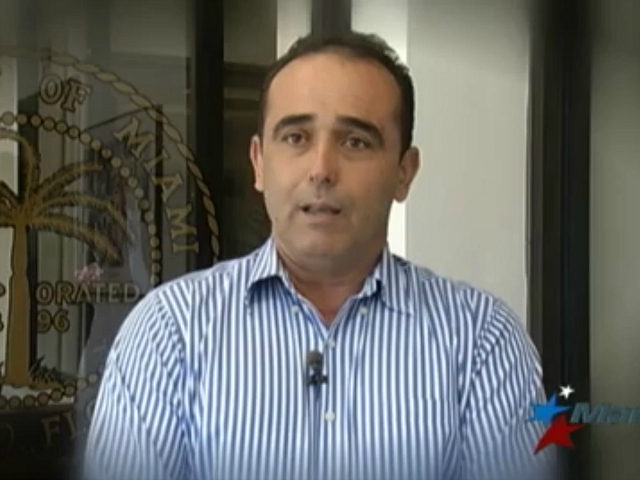The leader of the Cuban dissident group Christian Liberation Movement, Eduardo Cardet, was stabbed and beaten recently in the maximum-security prison he was forced into in 2016 after reportedly refusing to mourn dictator Fidel Castro.
Cardet was sentenced to three years in prison for assaulting a police officer, a crime eyewitnesses say he did not commit and for which there was no evidence. His arrest occurred, according to his family, after Cardet refused to sign a “condolence book” for the Castro family after the dictator’s death in November 2016.
Cardet’s wife, Yaimaris Vecino, told the Miami-based outlet Martí Noticias on Wednesday that Cardet is currently sporting “two stab wounds in the abdomen, which we do not know the origin of.” She noted that he also exhibited bruises consistent with punches. Vecino first learned of the attack on December 19, Martí notes, when authorities transferred Cardet to a maximum-security prison without explanation.
At the time, the Christian Liberation Movement—a dissident group that opposes communism on Christian principles—issued a press release stating that Cardet “was attacked by surprise by various common criminals.”
“Without speaking, they began to beat him brutally … the aggressors then called in military guards to take Eduardo out of the area,” the release read.
The Castro regime often uses prison transfers as a tactic to diminish dissident morale and punish their families. As a 1999 Human Rights Watch report explains, “The transfers penalize prisoners by forcing them to reestablish themselves at a new facility, making contact with family members more difficult, and impeding prisoners’ opportunities for gathering and disseminating information about prison abuses.”
Police had denied Vecino’s requests to visit her husband for a month following his transfer.
“I went to see Eduardo this Monday. Nothing good,” Vecino told Martí. “What happened to him was much more grave than what we thought.”
She noted that he appeared to exhibit concussion-like symptoms from blows to the head—”He still gets dizzy and does not feel well”—in addition to the stab wounds. Vecino added that the inmates police believe conducted the attack still reside in the same quarters as Cardet, allowing for a repeat of the incident.
Prior to the beating, Cardet was already suffering adverse health effects from his chronic asthma, his family told human rights advocacy groups after his arrest.
Speaking to the Spanish Cuban affairs publication Diario de Cuba, Vecino also noted that there is a small chance that authorities would return Cardet to a minimum security prison. Since he was sentenced on charges of assaulting a police officer, Cardet is considered a violent offender.
“They should resolve in January whether he progresses to minimum security or not, but we do not know anything for sure,” Vecino said.
The Cuban regime committed over 10,000 politically-motivated arrests in 2016, according to the monitor group the Cuban Commission on Human Rights and National Reconciliation (CCDHRN). The number was significantly larger than the 8,000 such arrests in 2015, inflated by President Barack Obama’s visit to the island and the death of Fidel Castro.
Cardet, who took over his dissident group after the suspicious death of predecessor Oswaldo Payá, was certified a prisoner of conscience by Amnesty International in February 2017, which demanded he be “freed immediately” at the time. He is one of the few dissidents considered dangerous enough to keep in prolonged imprisonment, a tactic that seemed to fall out of favor after Raúl Castro took over for his brother and began relying on “catch-and-release” arrests to terrorize vocal dissidents.
Cardet’s case reflects the continued repressive state of the Castro regime despite overtures from the Obama administration that began in 2014. In a recently-released report on 2017, Human Rights Watch (HRW) found that the government “continued to repress and punish dissent and public criticism” throughout the year and resorting to “beatings, public humiliation, travel restrictions, and firings” to control the populace.

COMMENTS
Please let us know if you're having issues with commenting.